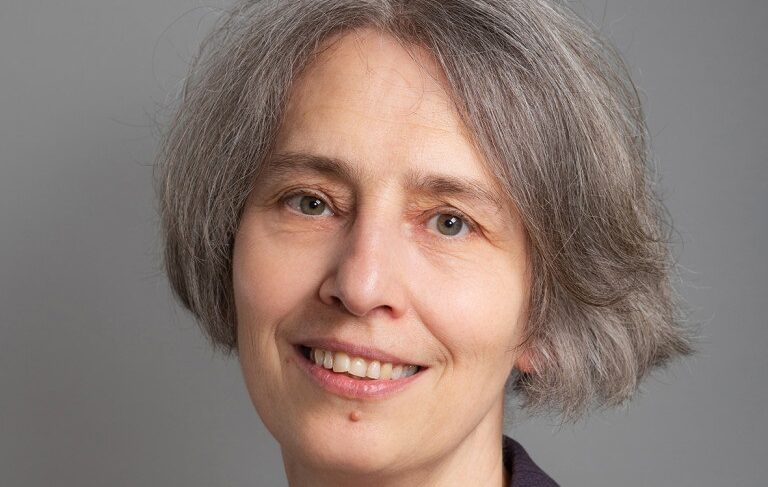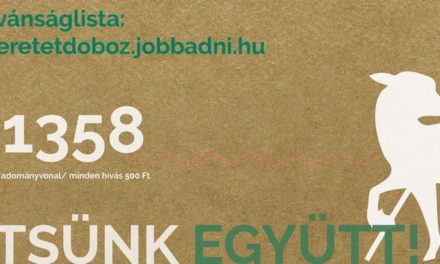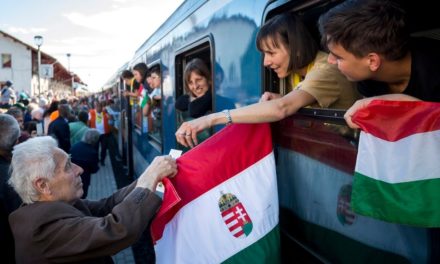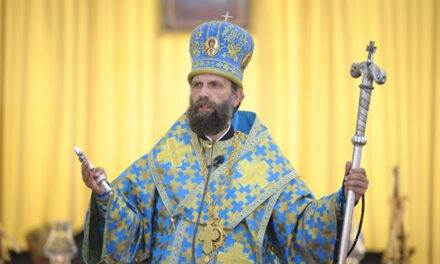Sister Eszter Baráti, aka Sister Kinga, met the School Sisters of the Blessed Virgin Mary at the age of 16, whose charisma influenced her so strongly that she applied for admission to the order at the age of 19. Today, in a unique way, without a veil or habit, she teaches religious doctrine imbued with self-awareness and leads spiritual exercises for children and adults, and in the summer she surfs on Lake Balaton.
How does one become a nun today and what does one's family say? How do you experience being single? He also talks about similar exciting questions in the following interview.
"We hear God's call in our hearts"
At the end of the 7th grade, Eszter's twin brother was admitted to the Benedictines in Győr on the condition that he start studying religion. Her mother also asked Eszter if she would like to join, and she said yes. Here he found a community of friends, and then graduated from the Boldogasszony School Sisters high school in Budapest.
"Since monasticism has existed, we have heard and responded to God's call. For me, for example, it came in the form of a sudden, joyful realization that I have a job and a mission in this world: I want to do something for God and people. This happened in 1985, when "scientific materialism" was still the official worldview, although the existing power system was already cracking. For me, confessing my faith and choosing the monastic lifestyle was also a kind of rebellion against the oppressive ideology"
the nurse begins.
As she says, the fact that becoming a nun is a process also helped her decision. He was a candidate for five years, after which came the novitiate, which is a year of intensive training and preparation to continue life as a member of a monastic community. At the end of this, they can make the temporary vows, which are valid for three years: at this time
they accept virginity, poverty and obedience.
Candidacy means that candidates live with the Sisters, but not yet fully committed. With perpetual vows, a nun becomes a full member of the community, which can be applied for after at least three years of living as a temporary vowed monk.
Sister Kinga's family was not very religious, so her father did not support his daughter's decision at first, but over time he accepted it.
"He mainly convinced me that I was in the right place when some of my fellow candidates and I slept in our family apartment one weekend, and he saw how cheerfully we were cooking, singing and having a good time together"
he explains.
"Clothing doesn't change the essence"
A common characteristic of all Catholic orders is that Jesus is the center of the community and the source of their unity. The difference is in charisma, that is, in spirituality, and in what they emphasize in service. In terms of clothing, many female monastic orders have decided in recent decades not to wear the veil and monastic habit, which was the "distinguishing mark" of nuns for centuries.
"Monasticism is not part of the church hierarchy, but a 'from below' initiative. There are seven sacraments in the Catholic Church, and this does not include monasticism. This gives us a kind of flexibility in how we live and interpret our mission. That is why there are those who consider outward appearance important, and there are those who do not.
We, the School Sisters of Our Lady, operate as an international order in thirty countries. We don't have a uniform rule regarding clothing: in Africa and Asia, our sisters wear clothing appropriate to the culture there, in Argentina they wear gray veils and habitus, in Brazil they wear "civilian". In Europe, only in Hungary do we not wear the black veil and habitus"
says Sister Kinga.
She also has a veil, sometimes she wears it, for example on major holidays, but as she says, in the last five years, young sisters who have taken vows have not even been given such a dress. According to him, who wears what doesn't change the essence at all, he doesn't make a big deal out of it.
"It is in the Holy Scriptures (1 Corinthians 11:4-10) that women pray with their heads covered, but in addition to that, the Bible contains many sentences in which the reflection of the culture and way of thinking of two or three thousand years ago can be recognized. Jesus and his disciples, including Saint Paul, were born into a patriarchal society. The imprint of this echoes in many places in the Bible. The task of the Church - that is, the community of believers in Christ - is to interpret and pass on the message of the Holy Scriptures that is still valid today. The founder of our order established our monastic community in the 19th century when he realized that girls did not have the same opportunity to go to school, receive education and training as boys.
It is our job as monks to raise awareness and proclaim that women and men are equal in the eyes of God.
What is an old phrase in the Hungarian language: "a girl in a line for sale", is still a common practice in many parts of the world: girls are given and taken - going to school is the breaking point for them. But back to wearing a veil: I don't wear it because I don't like the idea that women cover their hair to show their subordination, or to do so - only them! – in order not to be seduced by men.
With this, I am not promoting freedom at all, but mutual respect," said Sister Kinga.
She adds: she also doesn't wear a veil because she doesn't want to be pigeonholed at first sight. "Of course, I accept that many consider me a representative of the church. I think it's important to hear the voices of those who are happy that we are here, as well as those who are critical of us. If someone had an unpleasant experience with the church, they can say so. I like it when you only find out that I'm a nun during the conversation or when I want to tell you. And there are times when I don't want to.
When they find out I'm a nun, I experience two extremes. One is idealization: some people think that nuns float ten centimeters above the ground and that they don't eat bread, only wafers. The other extreme is that they have a negative opinion or experience of the Catholic Church, and they project all their dislikes about the Church onto me as a representative of the Church."
“You mentioned listening to critical voices. What do you think about the accusations against the priests?" I asked Eszter the question.
"Celibacy is also not the essence of the Church's teaching. It didn't even exist for four centuries after Jesus. I don't like to dwell too much on this issue, because there are many priests who live their vocation brilliantly in celibacy, but it is also possible that this requirement will be abolished because the world has changed. There is no contradiction in a priest getting married, since in the Eastern Catholic Churches priests decide before their ordination whether they will marry or live celibate.
Regarding the accusations against the clergy: the leaders of the Catholic Church made several statements in which they expressed their regret regarding the church abuses discovered in Hungary. My personal opinion is that this is still very little. I find that most of my church environment is in the avoidance phase and denies the seriousness of the problem. The leaders of the Hungarian Catholic Church should take the lead in conducting a comprehensive investigation covering all its institutions, which would prevent generalizing accusations ("all priests are pedophiles"), but would invite us to face the sad reality: based on the statistics of comprehensive research conducted in other countries, we can probably that the cases revealed so far are only the tip of the iceberg," he answers.
Days of a Modern Nun
Eszter Makón lives in a community of sisters, in the old-fashioned way of speaking, in a monastery or convent. Here, three sisters form a small community, each of them has a separate room. In addition to teaching, Eszter holds an hour of silent meditation prayer every day, usually in the morning before starting her day at the school where she teaches. Over the years, he has gone from a bound prayer to a prayer without words. As a common prayer, they participate in the parish Mass every day. Also, there is a sister meeting every week, when the sisters discuss things in their lives, and from time to time they also go to spiritual exercises.
During the retreat, we retire, soon, for example, to the Jesuit House of Life Planning, where we spend all our time experiencing the reality of God in the presence. We sit in a circle, we form a community. Mindful time spent in nature is also an important element of spiritual practice, since nature is the first teacher of contemplation. Every day, we participate in Holy Mass, where we are invited to the feast of Jesus, the Lamb, who became bread and was transformed, and we experience unity with him and through him. The groups are mixed and anyone can sign up for them," he says.
Eszter likes to exercise in her free time.
"Every year I go surfing on Lake Balaton, and in the last decade it has become part of my mission to make this available to others, so in the summer I organize a family and youth camp on the Balaton shore for our students and their family members from Makó.
I also consider it more and more important to nurture family relationships. I recently went to a theater performance by a twelfth grade Waldorf class, including my niece. I really enjoyed and was happy to see how talented young people are! I recently bought an e-book reader so that I can also read books that have not yet been published in Hungarian (on the border areas of spirituality, theology, meditation, psychology and ecology), but I also listen to podcasts. I am interested in the role of religion in society. I think it's important to read criticisms and opinions as well. One of my most important missions is to pass on all the acquired knowledge in a simple and understandable form," he says about his everyday life.
"People shape their world view using other channels"
Eszter really likes to teach, according to her, she started holding "reform religious classes" for children a few years ago. The reason for this is that although he had previously taught the students the sacraments, the catechism and Bible stories in religion class, he saw that despite talking about goodness and love, repentance and forgiveness, the children were (too) rude to each other and hurt them each other. As a result of this experience, he began to learn non-violent communication, peer mediation, and then positive discipline.
They aim to build a new kind of relationship system based on mutual respect - in the teacher-student-parent relationship. In addition to these, Eszter also conducts grief processing and dance meditations, as well as silent meditation - contemplative spiritual exercises - the latter is dear to her heart.
The sisters keep in constant contact with their colleagues living in other countries. Eszter participated in a one-year international program in Kenya and Rome, which, according to her, reshaped her world view.
"In principle, we live in a Christian country, but I see that today, for example, child baptism is based on tradition rather than living faith. Many people complain that faith is dying out, but I see that people simply gather their own world view through many other channels, such as the Internet. We are no longer part of a closed system.
In this situation, it is a great and beautiful challenge for us to convey our faith in such a way that it attracts people, especially young people."
The School Sisters of the Blessed Virgin also participate in formal education, and are also active in hospitals and in the social sphere; they hold retreats and visit prisons. "I would rather say that our charisma is to promote unity from the local level to the global level. In the spirit of our ordinary spirituality, we remedy some deficiency in the field of broadly understood education. Because we can no longer live as we have done: we are exploiting the Earth with our current system, and this is not right, and I dare say that it is one of the greatest sins of the people of the 21st century. We teach obedience in our schools, which does not mean that we accept everything and do what a master dictates, but that we notice: we are part of an order that goes beyond ourselves and is bigger than us, and we obey it. We look for the signs of the times, and if we notice a problem, we speak up and act to solve it.
I think the common task of religious people is to open the eyes of humanity: we are more than our own little world view.
When we realize that we are part of a greater unity, we become able to not only take care of ourselves and our narrow environment, but also to expand our hearts more and more, and thereby abandon the self-destructive way of life that generates irreversible processes," he says.
"Am I only staying in the order because I'm not brave enough to come out?"
Are you missing relationships, children and sexuality in your life? - I asked the compromising question to Eszter, who without batting an eye, told me completely openly and honestly in her answer. "I also experience this as a development process. When I was a university student, I was asked if I wasn't afraid of being surrounded by so many women, and we would go to each other's minds... and yes, there are times when it is difficult to get along with each other, to bear each other (Eph 4:2), and at such times I ask myself in amazement the question, what am I looking for here? However, over the years, I have come to realize that women's communities, including ours, have enormous inner strength, and it is part of our mission to live with it. For example
we can be peacemakers, we can bring a much-needed discourse into society.
But, of course, I also experienced the shortcomings you mentioned, and it made me think about my own nunnery. I had platonic loves in my youth, so perhaps it was easier to commit to nunhood. In retrospect, I realized that I am a late bloomer. Hormones probably also helped me to face some existential questions intensively between the ages of 30 and 35. Did my vocation evaporate because my image of God changed, my image of the church was transformed and I said goodbye to some of my illusions? Isn't what I enthusiastically interpreted as a divine call just self-deception and "sucking"?
And most of all, I was haunted by the fact that I'm only staying in the order because I'm not brave enough to come out? I was 35 when I moved out of the sorority for a year to see if I belonged here. A few things became clear to me.
I came to the conclusion that there is often no rational explanation for how our lives turn out, why our path turns this way or that. And we don't even have to understand that. Our vocation is not a pre-written script, but the path we walk. I am free; there is no right or wrong decision, but rather a series of decisions that I could/can make according to my best intentions in a given situation. I am free to live in the present.
Now I don't feel lonely at all, I don't think I've deprived myself of anything. I feel good in my own skin, I experience the miracle of existence every day.
Over time, I realized that each way of life has its advantages and disadvantages, marriage as well as monasticism. None of them are syrupy.”
one.hu
Photos: Sister Kinga












